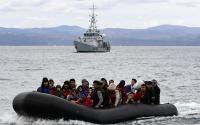Richard Norton-Taylor, Ewen MacAskill, and Ian Black in Brussels2 July, 2002
America's European allies expressed "deep regret" yesterday over US threats to pull out of UN peacekeeping operations, the latest in a string of disputes shaking the transatlantic alliance.
The Bush administration said it would not budge in its opposition to the new international criminal court, which was created yesterday. Threatening to block a renewed mandate for the Bosnian peacekeeping force, it argues that the ICC could be a forum for politically motivated actions against its troops serving overseas.
"This is a very important matter of principle about protecting Americans who uniquely serve around the globe in peacekeeping efforts," said Ari Fleischer, the White House press secretary. "The world should make no mistake the United States will stand strong and stand on principle to do what's right to protect our citizens."
The European commission president, Romano Prodi, said he was deeply concerned by Washington's opposition. "It's another movement of division between Europe and the US that we have to avoid at any cost," he said.
Per Stig Moeller, foreign minister of Denmark - which has just taken over the EU presidency - angrily condemned the American stance.
"I deeply regret this dramatic step that threatens UN peace operations in general," he said as high-level Nato and EU committees convened in emergency session to discuss the crisis.
Tony Blair insisted that safeguards built into the ICC's statute made it "inconceivable" for British peacekeeping forces - or their American counterparts - to risk prosecution for alleged war crimes. Individual members of armed forces would only be prosecuted for war crimes, crimes against humanity or genocide if their own courts took no action. "We understand the concerns of the United States, they are legitimate concerns, but our belief is they will be met," the prime minister said.
Lord Ashdown, the UN's high representative in Bosnia, expressed his concern directly to Colin Powell, the US secretary of state, in a phone conversation. He hoped that the US administration "would not do anything that placed at risk the huge progress towards the peace and stability achieved since the end of the war".
Last night Nato played down the risks to the S-For peacekeeping force in Bosnia, saying it could continue whatever the US position because the mission had been authorised by the 1995 Dayton peace accords.
But the US threat has been criticised across Europe as a galling example of America's rapidly accelerating trend towards unilateralism under the Bush administration.
EU diplomats warned there were now worries about other UN-mandated peacekeeping operations, including the Nato-led K-For mission in Kosovo. "This is a question with implications that go far beyond Bosnia," said one.
The increasingly rancorous dispute between Britain and the US over the ICC is the latest in a string of quarrels ranging from the treatment of al-Qaida prisoners to steel tariffs, from the conduct of military operations in Afghanistan to Yasser Arafat's Palestinian leadership.
Whitehall advisers are angry and deeply worried. Such phrases as "very unhelpful", "bloody-minded", "playing to the gallery" are being used across departments - including at the Ministry of Defence. "What can be so special about US soldiers and officials that they must be shielded unconditionally from the supposed hazards of trial by an international tribunal?" asked General Sir Hugh Beach, a retired army officer.
In addition to the row over the ICC, British officials are increasingly sceptical about US military conduct in Afghanistan. Mr Blair argued in the autumn that the best way to tackle terrorism was by building strong democratic societies, but Mr Bush has shown scant interest since the Taliban were defeated. British military chiefs say their opposite numbers in the Pentagon regard peacekeeping as for "wimps".
London was also dismayed at the way the Pentagon paraded al-Qaida prisoners in its Cuban base at Guantanamo Bay and denied them the protection of the Geneva convention. Perpetual warnings by the US administration of new terrorist attacks are described in Whitehall as "meaningless".
The clearest divide came in the wake of Mr Bush's speech on the Middle East, in which he declared Mr Arafat to be someone with whom his administration could no longer do business. Mr Blair took a different tack, reflecting the European view that while Mr Arafat had been a disappointment, he was the elected leader of the Palestinian people.
The Middle East has thrown up other disagreements. "Iraq is approaching down the track," one worried British official said yesterday. Amid bellicose statements from the White House, Mr Bush has made the overthrow of Saddam Hussein one of the main objectives of his administration. But though Britain acknowledges that his demise would be welcome, regime change is not a policy aim.
There is a widespread feeling in Whitehall that the Bush administration is playing a dangerous game by trying to combat terrorism but ignoring its causes.






